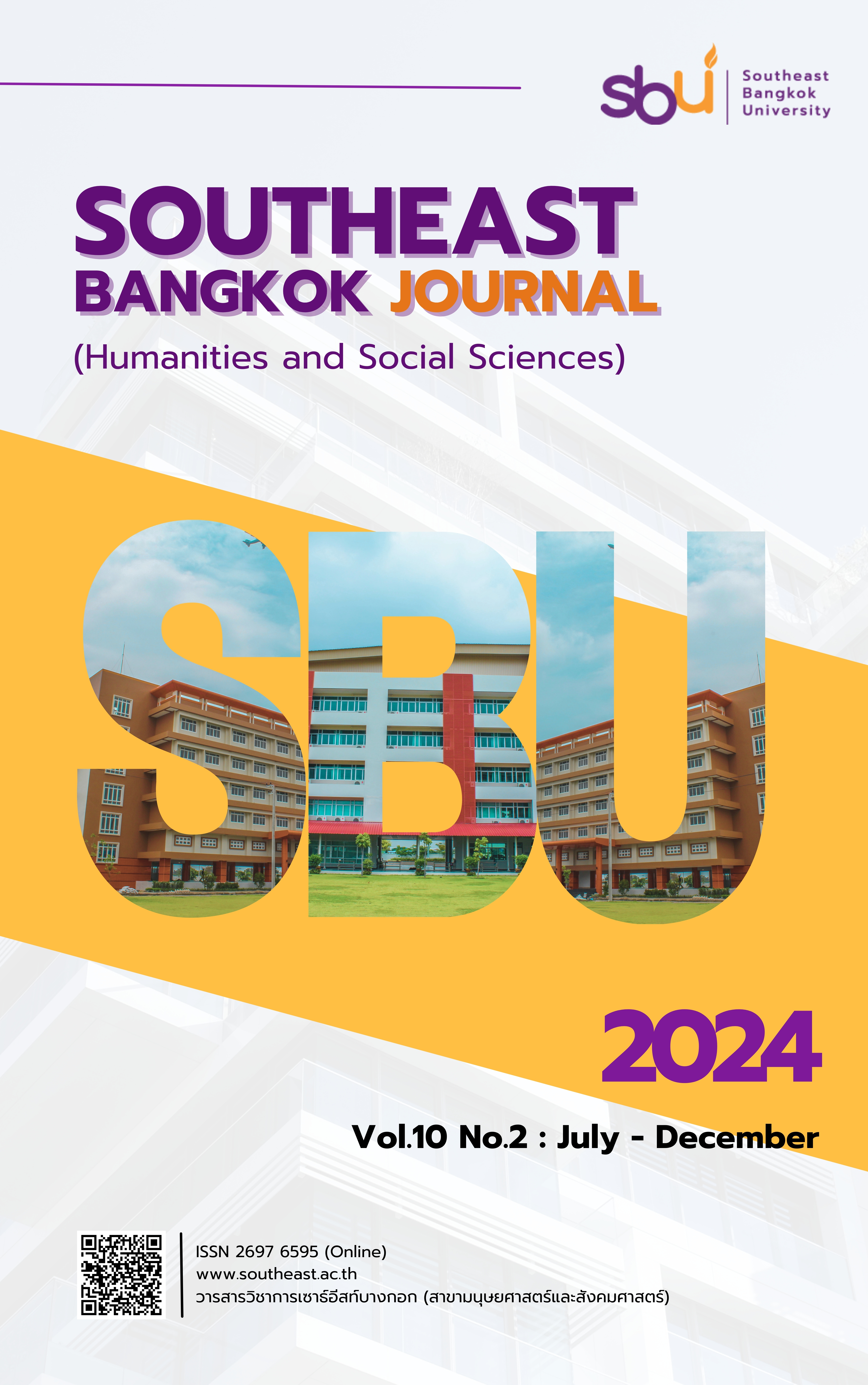USING ACTIVE LEARNING TO DEVELOP ENGLISH VOCABULARY KNOWLEDGE OF GRADE 6 STUDENTS
Main Article Content
Abstract
This research aimed to 1) investigate the English vocabulary proficiency of Grade 6 students using active learning, 2) compare the English vocabulary proficiency before and after implementing active learning strategies, and 3) explore Grade 6s’ attitudes towards using active learning to develop their English vocabulary knowledge. The population was 22 Grade 6 students from Wat Sri Photaram School in Chiang Mai Province during the first semester of the 2023 academic year. The research instruments were 1) lesson plans, 2) an achievement test, and 3) a questionnaire on the use of active learning in developing their English vocabulary knowledge. The statistical analyses were mean, standard deviation, and One-sample t-test. The findings revealed that 1) the English vocabulary knowledge of Grade 6 students after implementing active learning strategies was higher with 0.01 statistical significance and 2) the overall attitudes of Grade 6 students regarding the use of active learning activities to develop their English vocabulary knowledge were high ( = 4.13,
= 0.72).
Article Details
References
Dechakoopt, P., & Yindeesook, P. (2017). Kānrīanrū chœ̄ng ruk bǣp rūam phalang kap PLC phư̄a kānphatthanā. [Active learning combined with PLC for development]. Bangkok: Chulalongkorn University Press.
พิมพันธ์ เดชะคุปต์ และพเยาว์ ยินดีสุข. (2561). การเรียนรู้เชิงรุกแบบรวมพลังกับ PLC เพื่อการพัฒนา. กรุงเทพฯ: สำนักพิมพ์แห่งจุฬาลงกรณ์มหาวิทยาลัย.
Donbuakaeow, S. (2018). Phāsāsāt samrap khrū sō̜n phāsā ʻAngkrit. [Linguistics for English Teachers (2nd ed.)]. Bangkok: Chulalongkorn University Press.
แสงระวี ดอนแก้วบัว. (2561). ภาษาศาสตร์สำหรับครูสอนภาษาอังกฤษ (พิมพ์ครั้งที่ 2). กรุงเทพฯ: สำนักพิมพ์แห่งจุฬาลงกรณ์มหาวิทยาลัย.
Freeman, S., Eddy, S. L., McDonough, M., Smith, M.K., Okoroafor, N., Jordt, H., & Wenderoth, M.P. (2014). Active learning increases student performance in science, engineering and mathematics. Proceedings of the National Academy of Sciences U.S.A., 111(23), 8410–8415.
Jammore, P. (2019). Kānphatthanā kitčhakam kānrīanrū dōi chai kitčhakam pen thān sœ̄m thaksa phāsā ʻAngkrit phư̄a kānsư̄sān samrap nak rīan namat yom sưksā pī thī nưng. [The Development of learning activities through activity based learning to enhance English communication skills for grade seven students]. (Master’s independent study, Naresuan University).
ปิยะนุช แจ่มหม้อ. (2563). การพัฒนากิจกรรมการเรียนรู้โดยใช้กิจกรรมเป็นฐานเสริมทักษะภาษาอังกฤษเพื่อการสื่อสารสำหรับนักเรียนชั้นมัธยมศึกษาปีที่ 1. (การค้นคว้าอิสระปริญญามหาบัณฑิต, มหาวิทยาลัยนเรศวร).
Kaplan, R. S., & Norton, D. P. (1996). The balanced scorecard: Translating strategy into action. Boston: Harvard Business School Press.
McKinney, W. J. (2008). Teaching and Learning in the college classroom: A review of the research literature. Michigan: University of Michigan Press.
Office of the Basic Education Commission. (2019). Phrarātchabanyat kānsưksā hǣng chāt Phō̜.Sō̜. sō̜ngphanhārō̜ihoksipʻet. [National education act 2018]. Bangkok: Author.
สำนักงานคณะกรรมการการศึกษาขั้นพื้นฐาน. (2562). พระราชบัญญัติการศึกษาแห่งชาติ พ.ศ.2561. กรุงเทพฯ: ผู้แต่ง.
Office of the Secretariat of the Education Council, Ministry of Education (2019). Māttrathān kānsưksā khō̜ng chāt Phō̜.Sō̜. sō̜ngphanhārō̜ihoksipʻet. [National educational standards 2018]. Bangkok: 21 Century.
สำนักงานเลขาธิการสภาการศึกษา กระทรวงศึกษาธิการ. (2562). มาตรฐานการศึกษาของชาติ พ.ศ.2561. กรุงเทพฯ: 21 เซ็นจูรี่.
Phattarakorn, S. (2009). Phon kānčhatkān rīanrū yāng mīchīwitchīwā thī mī tō̜ khwāmsāmāt nai kān kǣ panhā læ kānsư̄sān thāng khanittasāt khō̜ng nak rīan namat yom sưksā pī thī sī rư̄ang khwām nā čha pen. [The effects of organizing active learning on problem solving and mathematical communication abilities of mathayomsuksa III students in probability]. (Master’s thesis, Srinakharinwirot University).
สัญญา ภัทรากร. (2552). ผลการจัดการเรียนรู้อย่างมีชีวิตชีวาที่มีต่อความสามารถในการแก้ปัญหาและการสื่อสารทางคณิตศาสตร์ของนักเรียนชั้นมัธยมศึกษาปีที่ 4 เรื่อง ความน่าจะเป็น. (วิทยานิพนธ์ปริญญามหาบัณฑิต, มหาวิทยาลัยศรีนครินทรวิโรฒ).
Pruatikul, S. (2014). Khunnaphāp phū rīan kœ̄t čhāk krabūankān rīanrū. [Learner quality comes from the learning process]. Journal of Education Burapha University, 6(2), 1–13.
สถาพร พฤฑฒิกุล. (2555). คุณภาพผู้เรียนเกิดจากกระบวนการเรียนรู้. วารสารบริหารการศึกษา มหาวิทยาลัยบูรพา, 6(2), 1–13.
Wat Sri Photharam School. (2020). Rāingān kānpramœ̄n tonʻēng khō̜ng sathān sưksā pračham pī sō̜ngphanhārō̜ihoksipsī. [Educational institution self-assessment report for the year 2021]. Chiang Mai: Author.
โรงเรียนวัดศรีโพธาราม. (2564). รายงานการประเมินตนเองของสถานศึกษา ประจำปี 2564. เชียงใหม่: ผู้แต่ง.


